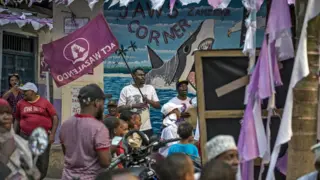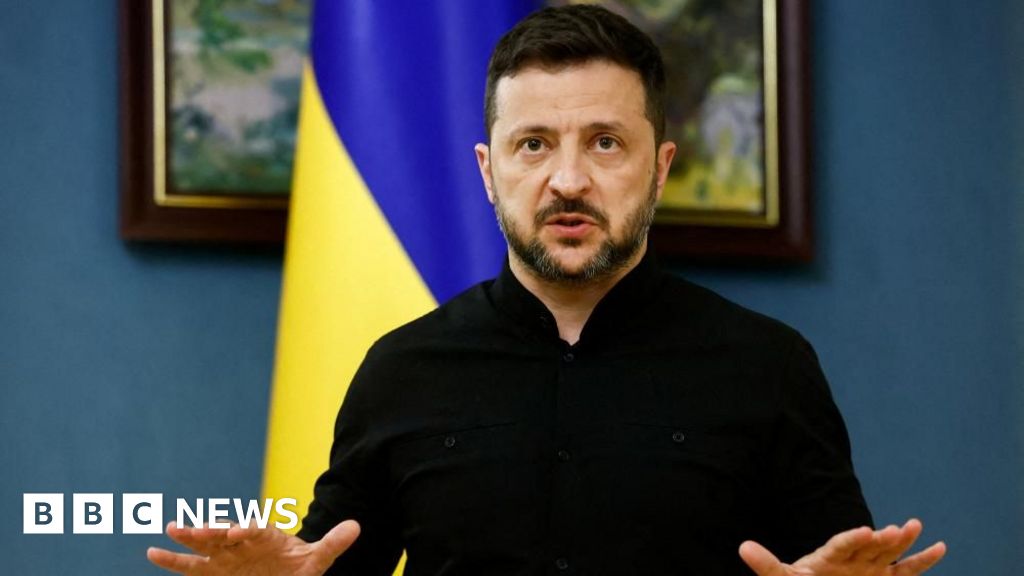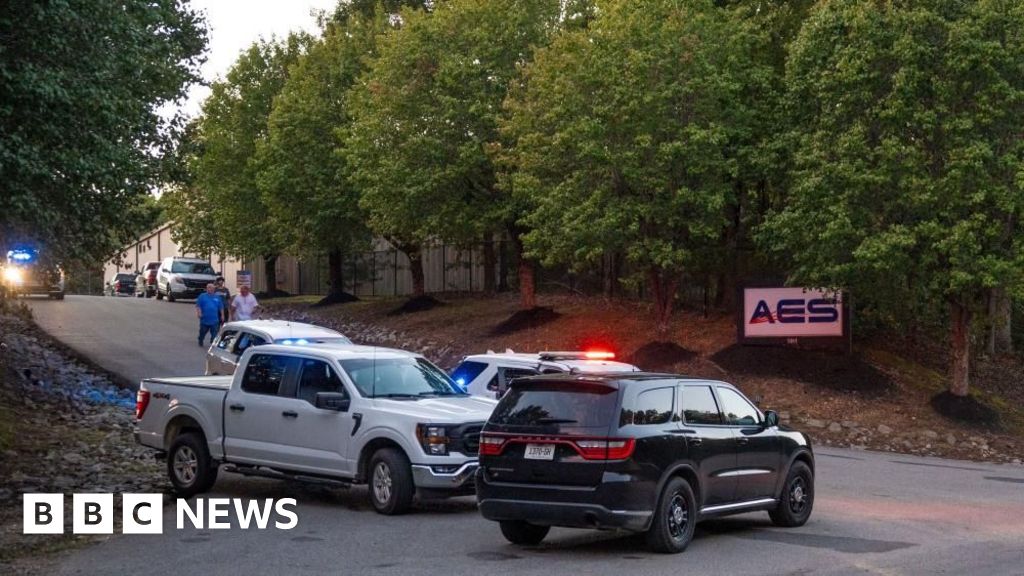Alfred LasteckBBC Africa, Dar es Salaam
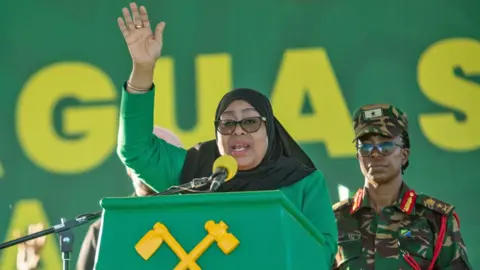 EPA/Shutterstock
EPA/ShutterstockWith no heavyweight opposition candidates cleared to compete in Wednesday’s election, many Tanzanians feel the vote is less like a contest and more like a coronation for President Samia Suluhu Hassan, as she faces her first presidential election.
The 65-year-old became the East African nation’s first female head of state after the death in 2021 of sitting President John Magufuli. He was admired on the one hand for his no-nonsense drive to stamp out corruption but criticised on the other for his authoritarian clampdown on dissent and controversial attitude towards the Covid pandemic.
President Samia, who had been vice-president, seemed like a breath of fresh air – and with her warmer and friendlier style, she initiated reforms that seemed to represent a radical departure from her predecessor’s policies.
Her four Rs policy – “reconciliation, resilience, reform and rebuilding” – reopened Tanzania to foreign investors, restored donor relations and mollified the International Monetary Fund (IMF) and World Bank.
“She made a difference, the lost relationship between Tanzania and international organisations such as World Bank was restored,” political analyst Mohammed Issa told the BBC.
But over the last two years or so, the political space has drastically shrunk – and the targeting of government critics and opposition voices is said to be more ruthless now than it ever was under Magufuli, with regular abductions and killings now reported.
“Samia came in with a conciliatory tone, but now she has become bold and makes tough decisions that many did not expect from her,” said Mr Issa.
“She is now widely blamed for some things like abductions, killings, repression of opposition and other issues on security.”
This is reflected in reports by Freedom House, a US-based democracy and human rights advocacy group, which ranked Tanzania as “partly free” in 2020 and “not free” last year.
The government has not commented on the allegations.
Samia’s CCM has won every election since the reintroduction of multi-party democracy in 1992, but the campaigns are usually vibrant with robust debate between the rival parties.
While the electoral commission has cleared 17 presidential candidates to stand this time, the main opposition party, Chadema, is barred with its leader, Tundu Lissu, currently on trial for treason.
He had been calling for electoral reforms before his arrest in April – and the party is now urging its supporters to boycott the poll.
His deputy, John Heche, was also arrested last week – and told the BBC just before his detention that President Samia’s so-called reforms were hollow: “Yes, rallies were allowed again, but today Chadema can’t do its mandate because the promises were fake.”
Meanwhile, presidential hopeful Luhana Mpina, from the second largest opposition party, ACT Wazalendo, has also been disqualified – twice.
He had managed to get his candidacy reinstated by the High Court after he was barred over a procedural issue – but when the Attorney General appealed last month, the electoral commission decided to uphold the disqualification.
This leaves smaller opposition parties like Chaumma and CUF in the race, but in reality there is no chance of them stopping Samia winning her first personal mandate.
“The ruling party’s control, exclusion of the opposition and institutional bias undermine electoral credibility. Limited civic space and low voter engagement further weaken inclusiveness,” said political analyst Nicodemus Minde in a recent report for the Institute for Security Studies (ISS) think-tank.
This has left some would-be voters, like Dar es Salaam resident Godfrey Lusana, despondent.
“We do not have an election without a strong opposition. The electoral system is not independent. We already know who will win. I can’t waste time to vote,” he told the BBC. “If the electoral commission was really independent, I would have voted.”
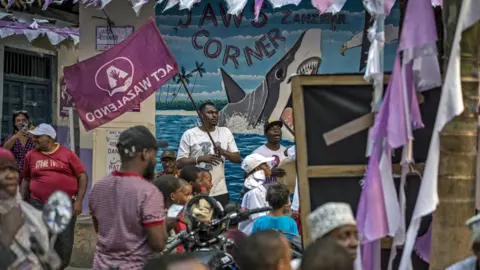 AFP/Getty Images
AFP/Getty ImagesThis is in stark contrast to the buzzing campaign on Tanzania’s semi-autonomous archipelago of Zanzibar – from where President Samia originally hails.
The islanders elect their own regional president and incumbent Hussein Mwinyi of the CCM is seeking another term, but faces stiff competition from ACT-Wazalendo’s Othman Masoud – who has been serving as his deputy in a unity administration.
On the campaign trail on the mainland, President Samia has capitalised on the initial praise she received for her motherly approach – seeking to govern through dialogue rather than decree.
This earned her the nickname “Mama Samia” – and at her rallies she has been promising to bring widespread development through better infrastructure, health and education.
Many women, especially those in rural communities, see her as a stabilising force.
“She brings dignity, we young women look up to her. We feel her presence as the president and that gives us confidence that we can be reliable to our communities now and in the future,” first-time voter Queen Castoric from the northern city of Tanga told the BBC.
But some women in urban areas, like Celina Ponsiana, who will also be casting her ballot for the first time in Dar es Salaam, are more equivocal: “Leadership isn’t only about tone.
“I believe the president has a task to do, first on unemployment. She has been supporting some but many still need help,” she said.
Another young woman in Morogoro, near Dar es Salaam, said she supported the president but refused to give her name to the BBC in case she faced a backlash from her contemporaries.
“Samia made us believe women can lead. I would love to say more, but many youth don’t talk positively about her,” she said.
Young people make up the majority of Tanzania’s 37.7 million people registered voters – and there is anger from some over the president’s silence on issues like the shocking abductions.
And while some give credit to President Samia for stabilising the economy, in some quarters there is even nostalgia for Magufuli given the rising reports of corruption.
Her tougher approach of late may come down to several issues.
In a traditionally male-dominated society, she has faced problems asserting her authority. At recent rallies she has been reminding voters who is boss: “Don’t forget I am chief of the defence forces.”
She may also feel undermined by colleagues. Within the CCM, there was some opposition to the fact that she became the party’s presidential candidate unchallenged.
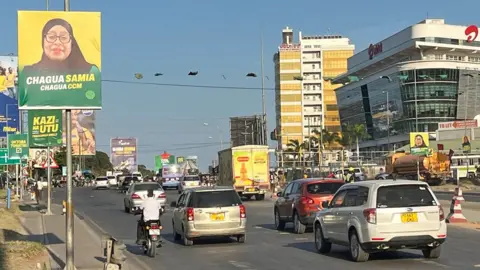
One senior party member who criticised her automatic candidacy – Humphrey Polepole – has since been abducted in mysterious circumstances.
There is also a suggestion that she has in fact become the pawn of a powerful network of business tycoons and other influential CCM backers, known colloquially as Mtandao, according to Mr Minde in his ISS report.
“Internal [CCM] party democracy has been stifled through an orchestrated move to make President Samia the sole candidate. While this has deepened divisions within the party, a façade of unity is being presented to the public,” he said.
It is believed that Magufuli refused to take orders from the Mtandao, preferring to stick to his own anti-corruption agenda.
Mr Minde warns that this has all contributed to a prevailing sense of fear in the East African nation. With the self-censorship of the media and the shrinking of political discourse, public debate has retreated to private conversations and social media.
Analysts warn that such detachment, especially among young people, could hollow out Tanzania’s democracy further – and create problems down the road for President Samia should there not be a big turnout and if protests kick off.
For Tito Magoti, a lawyer and young political activist, the demands remain simple.
“We want a free Tanzania where anyone has the freedom to speak,” he told the BBC.
“The freedom of movement and the freedom to do anything they wish.”
More about Tanzania from the BBC:
 Getty Images/BBC
Getty Images/BBC